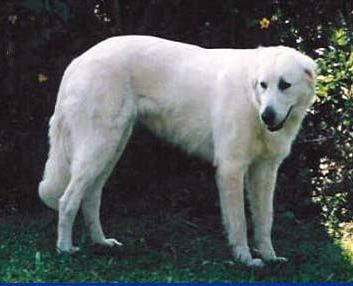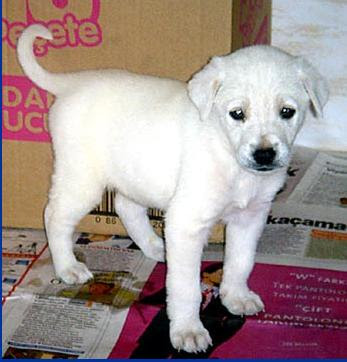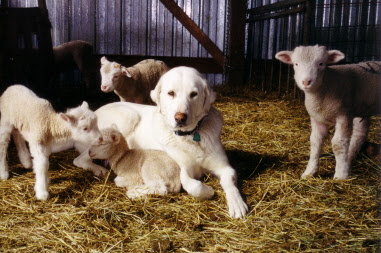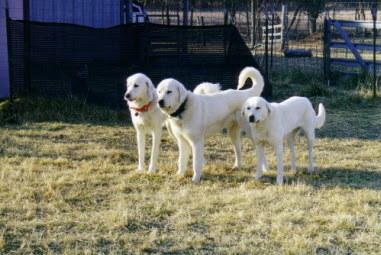




The Akbash Dog is an elegant rare breed from Western Turkey. The name stems from the Turkish word "akbas" meaning "white head". Akbash Dogs are intelligent, emotionally sensitive flock guardians that were developed 3000 years ago to fend off wolves and bears which threatened flocks of sheep and goats in Turkey. Any dog not strong enough, cunning enough, or aware enough of its surroundings did not survive in this harsh environment. Survival under such harsh and primitive conditions has created a tough, powerful breed capable of dominating an inexperienced owner or individual with little knowledge of canine behavior and the working dog mentality.
The Akbash Dog is one of the most beautiful of the guardian breeds, combining the grace and elegance of the gazehound with the power of the mastiff. Their primary function is to bond with and protect livestock from predation and theft. Their white, weather resistant, short, medium, to long length coats are coarse and non-matting, with very little doggy odor. Akbash Dogs tolerate both heat and cold temperatures well. They are tall, athletic dogs which can spring into action with amazing speed but are usually seen sleeping with or in sight of their flock. They should be calm with quiet mannerisms, show submissive posturing to livestock, and have low chase instinct.
Akbash Dogs are large but not considered a giant breed. Females range from 27" to 29" and weigh from 75-110 lbs. Males range from 28-32" and weigh 90-130 lbs. Both work equally well at maturity. Males are substantially larger and can usually intimidate more formidable predators, while females tend to mature earlier.
Livestock guardians are unique in combining submissive posturing to livestock with dominance and protectiveness. They bond to animals they were raised with and protect them from any perceived threats. Compared to other livestock protection breeds, the Akbash Dog doesn't drool, has an easy to care for coat, and generally protects better against stray dogs than some of the less dog-aggressive livestock protection breeds. Akbash Dogs are often more athletic and active than some of the other breeds and can get into more puppy play chase behaviors if not well supervised. However, as adults Akbash Dogs are far superior as livestock protection dogs, (having been documented to stand up to serious predation such as bear and wolves). They will bark and raise their hackles at unfamiliar animals or people approaching their territory unaccompanied by someone the dog knows. With people that they know or with chaperoned visitors, properly socialized dogs are gentle, friendly, and happy for a visit. What makes the Akbash Dog special is its ability to form strong bonds with both owners and livestock, and at maturity live in harmony with them and fiercely protect them with maternal zeal.
Both sexes make equally good guardians and rural companions, especially if neutered. Neutered dogs also live a longer, more disease free life. Even if breeding stock is desired, a neutered working dog provides protection for the livestock while the breeding dogs are distracted or indisposed.
Akbash Dogs are not for everyone. They are independent, self-thinking dogs that have no genetic memory of looking towards man for direction. A flock guardian pitted against predators must be able to assess any given situation on its own and act appropriately, or else the dogs' survival may be at risk. Many say they are cat-like in personality and certainly not a breed to cater to our every whim. As trained and socialized companions they are intelligent, loyal, affectionate, clean, and generally non-destructive in the house. Akbash Dogs conserve their energy and will consume much less food than other breeds similar in size, generally eating 3-5 cups of premium dog food a day. Strong maternal instincts allow them to bond with and protect their human and animal flock; thus you may expect a properly trained and well-socialized Akbash Dog to be fond of and gentle towards infants and young children, while remaining suspicious of non-introduced strangers, particularly on its own territory.
Getting Off to a Good Start:
Good pack leadership skills are a must when dealing with the developing Akbash Dog. Owners must be capable of properly challenging Akbash Dogs for authority over food and prized possessions and making timely corrections for resistance. The Akbash Dog does not mature until 2 years of age, and a concerted effort to socialize, guide, and lovingly demand respect is critical to the successful ownership of the breed. Therefore Akbash Dogs need to live with owners who are gentle but firm, commanding without being bullies, and understanding of the flock guarding mentality. How soon your Akbash Dog can be considered safe unattended with livestock depends primarily on how well you have supervised the pup and given consistent, well-timed corrections for any misbehavior from the start of ownership.
All young dogs require strict supervision and guidance as to what is right and wrong. Even puppies with excellent livestock aptitude may try to play with stock to which they have properly bonded as they would with another dog. This is especially true with the single pup without a canine playmate. It is critical they be strictly supervised through the first couple of lambing seasons and never allowed to play roughly with small or young livestock. How good the dog becomes at maturity depends on how well you can guide the dog through adolescence. They require 2 years of strict supervision and training in order to be reliable with young and small livestock unattended.
Companion Akbash Dogs should be placed in homes with a well-fenced (4'-6') yard of at least a quarter of an acre in a rural or semi rural area. They are generally inappropriately placed in town or in subdivisions, where their genetically intense guarding instincts and patrol barking may be a liability. I insist that dogs going to companion homes be taken to puppy socialization and obedience classes. Working dogs also should receive at least puppy socializing and basic obedience. These are large, powerful, rather independent dogs with a strong pack hierarchy and it is very important that they be well mannered and under control, be that home and in public. Dogs working in larger areas are less likely to get bored and develop play chase behavior.
Barking is the primary warning flock guardians' give would be predators, so dogs outside must reside where their barking will not bother anyone. They can be trained to limit their barking to only serious situations but they can still be expected to bark at unusual sounds and scents, particularly at night. The duty of a flock guardian is to keep all uninvited intruders away from the flock. An Akbash Dog's established territory belongs to the dog, and it should not be expected to tolerate intrusions from wandering neighborhood dogs.
Our Policies as Breeders..... What We Require of Owners:
What do we as breeders require of a new owner? We do not produce Akbash Dogs as a cash crop, nor do we broker our dogs, and our expectations of our buyers are the same. We place puppies with selected pre-screened individuals who have educated themselves about the breed. We generally like to see our dogs enjoying life in a semi-rural or rural setting on properties with adequate fencing. (Field fenced pastures require an electric top wire and sometimes bottom wire to confine this athletic breed.) Our mission is to raise the healthiest, most stable, well-socialized puppies possible and to match each new owner with just the right puppy temperament.
It is important to us that each new owner work closely with us in identifying their needs, along with developing a basic understanding of the Akbash Dog, (temperament, training and pack leadership skills) and a willingness to establish themselves as leaders and develop the proper relationship with their dog. When you get your pup, we will work closely with you to answer any questions or address any concerns relating to supervision and training to help insure success of the developing livestock guardian dog. The two years of strict supervision before an Akbash Dog can be considered a trusted fulltime guardian of any age stock is an investment which will pay dividends for many years to come. You must be willing to make that commitment in order to enjoy the peace of mind which comes from having a trusted guardian watching over your stock 24 hours a day.
http://www.akbashdogs.net/html/Akbash%20dogs.html

No comments:
Post a Comment